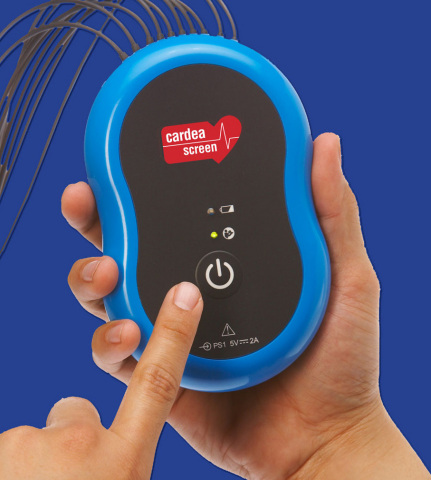SEATTLE--(BUSINESS WIRE)--Cardea Associates, a heart health product company, announces a major breakthrough in improving the reliability of the electrocardiogram (ECG) for identifying cardiovascular issues associated with sudden cardiac arrest (SCA) in young athletes. Although the ECG has been known to be very sensitive for detecting cardiac abnormalities, historically it has also been plagued with high false positive findings, up to 15 to 25 percent. A false positive is an incorrect determination that something is wrong, which can lead to expensive follow-up tests and needless worry. The high false positive rate has been a major barrier in the adoption of ECG screening as part of an athlete’s pre-participation evaluation. The new “Seattle Criteria”, coupled with recent research advances, are reducing false positives. Cardea’s hand-held CardeaScreen system has now achieved an abnormal finding rate of 2.5 percent in females and 3.5 percent in males, a dramatic reduction in false positives, and with no loss in sensitivity to identify pathologic conditions in athletes.
“This dramatic improvement is the result of focused research on appropriate ECG criteria,” stated Dr. David Hadley, president of Cardea. “Cardea’s engineering to improve ECG recording accuracy and consistency is well beyond industry practices. We are leveraging the tremendous computing power of the modern PC for complex signal processing and analysis.”
“We agree with the CardeaScreen interpretation of the ECG about 99 percent of the time," said Dr. Jonathan Drezner, lead author and organizer of the Seattle Criteria. “This is a dramatic improvement compared to standard ECG systems that do not use athlete-specific criteria. Using CardeaScreen increases our confidence and accuracy that nothing is missed. As director of the Center for Sports Cardiology and a team physician at the University of Washington, we see this as tremendous progress in this arena.”
Cardea’s chief medical officer, Dr. Victor Froelicher, summarized the breakthrough: “The old argument that the ECG wasn’t sufficiently reliable for routine inclusion in athlete health exams is no longer valid. It’s time to set aside past biases and begin the job of identifying young athletes at risk of SCA. In addition, although many of the abnormal cardiac findings are unlikely to lead to sudden death, they are important medical findings that should be managed appropriately to ensure a long and healthy life. Cardiovascular problems remain America’s number one killer, and early detection is just good medicine.”
Seattle-based Nick of Time Foundation exclusively uses CardeaScreen. The national organization is a pioneer in developing a cost effective, large scale cardiac screening program for youth. “Our volunteers like the CardeaScreen simplicity of use and our doctors love the high-quality ECG tracings and accurate interpretations,” said Darla Varrenti, executive director of the Nick of Time Foundation. “Additionally, the handheld CardeaScreen devices are convenient and easy to transport to our screenings around the Puget Sound region and are inexpensive to operate. We are replicating this program in cities across the country.”
CardeaScreen is used by high schools, colleges, professional sports teams, medical facilities and heart screening foundations across America. The rapidly growing library of ECGs has helped fuel the research, refinement and improvement in accuracy.
About Cardea Associates
CardeaScreen is a diagnostic tool that measures and records the electrical activity of the heart. It was developed by Cardea Associates, a company dedicated to saving lives through cardiovascular research and product innovation. Founded by David Hadley, PhD, and Victor Froelicher, MD, Cardea Associates works with research partners, institutions and thought leaders around the world to improve screening for heart health. Visit www.cardeascreen.com for more information.

